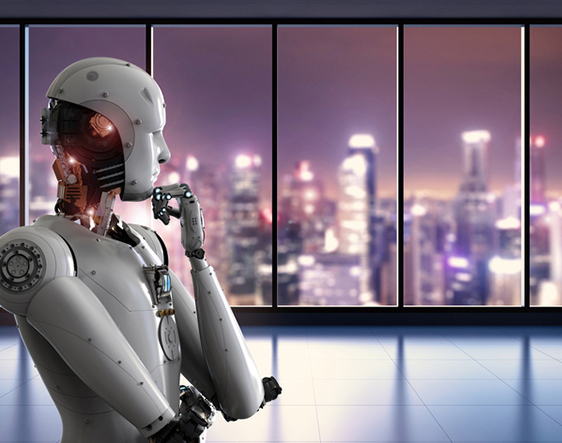HR departments say they want to build the next generation of amazing companies around artificial intelligence (AI), but they have been relatively slow in adopting new technology to power people operations. Already this year, AI is reshaping businesses and HR needs to be in the driving seat. Contributor Simon Robinson, Managing Director – Level Ltd
The test-and-learn period is over. AI is making its presence felt right across organisations in every industry, fundamentally transforming the way organisations and their workforces operate. Businesses will reap massive productivity gains as they focus on clear operational goals for AI. PwC predicts that a third of existing British jobs are at risk of being automated within 15 years, though it anticipates that roles will change rather than completely disappear.
In fact, AI offers a huge people dividend; but for its potential to be fully realised, HR must simply stop reacting to technological change and become proactive, putting in the hard work needed to harvest all the benefits of an AI-powered organisation. HR has a critical role to play in preparing the business for this monumental transformation by helping to build trust in AI, developing a positive vision of the future, and laying strong foundations.
Negotiating the relationship between people and AI
While AI promises a better employee experience and increased job satisfaction overall, some departments will shrink, others will expand, and jobs will change significantly. The workforce will be fearful about the impact of cognitive technology on their lives.
Among the questions people will have:
What happens if machines get it wrong? Automated decision-making relies on learning and testing, but systems can be fooled in a way that humans may not be. If AI is running manual labour, security, efficiency, and intelligence, how can we guard against machines making mistakes?
How can AI be unbiased? If the data being fed to machines is provided by naturally biased humans, how can we trust AI decisions to be neutral? A 2015 Accenture survey of managers found that while the majority (84%) believed cognitive machines would make them more effective, far fewer said they would trust advice from AI in making business decisions. Just 14% of first-line managers, rising to 46% of executives, were ready to trust AI advice.
Perhaps more worryingly, managers failed to rank interpersonal skills as being critically important in the era of AI, despite the fact these are the very talents that set humans apart from machines. If HR is to help shape the new AI-powered world and support a successful transition, the department must work to change both these perceptions. It must encourage people to trust machines, by laying their fears to rest, and help them better value their human skills. Teams need to be inspired to succeed alongside AI. People will be working with machines, not racing against them.
Preparing the organisation for AI success
Help to define what the future looks like
Work with the board of directors to define and shape a vision of the organisation, and the roles within it, that everyone can buy into. It is crucial that the current workforce understands the changes that are going to impact their jobs and everyday tasks.
Lay the foundations for new ways of working
Prepare the ground for new infrastructure, organisational framework, office space, and employee development programmes that will all be shaped by AI.
Build the workforce of the future
AI helps managers recruit the right workforce by finding talent from previously untapped sources, including candidates not actively looking for a new job. By using automated tools to attract and shortlist candidates, managers can concentrate on crafting job descriptions and interviewing.
Identify skill gaps and anticipate needs
Some organisations may need fewer people and others may need more, but most will need to adjust their balance of human skills. According to PwC, the top five most important skills to CEOs (in addition to technical expertise) are problem solving, adaptability, collaboration, leadership, and creativity and innovation.
Help current employees develop alongside cognitive machines
AI can crunch the data to find new roles for existing employees, matching their skills – even the hidden ones – with the new requirements of the AI-powered organisation, and identifying training opportunities.
Build a better culture of recognition and loyalty
AI helps here too, allowing HR to capture deeper, actionable insights about the emotional wellbeing of employees. It can also use performance data to flag when someone is due a promotion or reward of some kind.
The people dividend
As AI is introduced to a business, the human workforce starts to centre around softer people skills. Cognitive technology helps boost productivity and frees people from mundane work to focus on higher value, more enjoyable tasks – those that require a human touch.
AI will bring new intelligent applications to support frontline managers in making decisions that are consistent and compliant. By embedding their expertise into these applications, HR personnel can empower managers to motivate their teams, get the best performance out of people, and retain talent.
Many organisations no longer carry out annual performance reviews because they are too clunky, time-consuming, and ineffective. AI can add significant value by assessing employee performance in real-time, enabling immediate intervention and rewards.
Smart technology also helps the business manage unscheduled absences by driving better, more consistent decisions, and it assists employees to fulfil their regulatory commitments without error, therefore improving compliance.
Cognitive technology opportunities for HR
AI has real power to improve employee engagement, performance, and retention by using deep-data insights to drive better, more consistent, and bias-free decisions. Predictive intelligence like this gives HR a more strategic role in the organisation because it enables recommendations for new people programmes and policies to be based on solid evidence rather than gut feelings.
According to HfS Research, the business benefits of AI most valued by the C-suite are its ability to drive down operating costs (42%), improve customer experiences (31%), enable predictive decisions (31%) and improve the talent pool (26%), in addition to reducing reliance on labour by automating processes.
By using AI to predict accurate outcomes, HR can provide return on investment to make a solid business case for people programmes. With 42% of all companies planning to invest in AI in the next five years, now is the time for HR to embrace every advantage it offers and climb into the driving seat as the organisation races into the future.
Join the debate on AI with our complimentary Roundtable:
https://www.thehrdirector.com/roundtables/ai-hr-function-workforce-future-roundtable/









